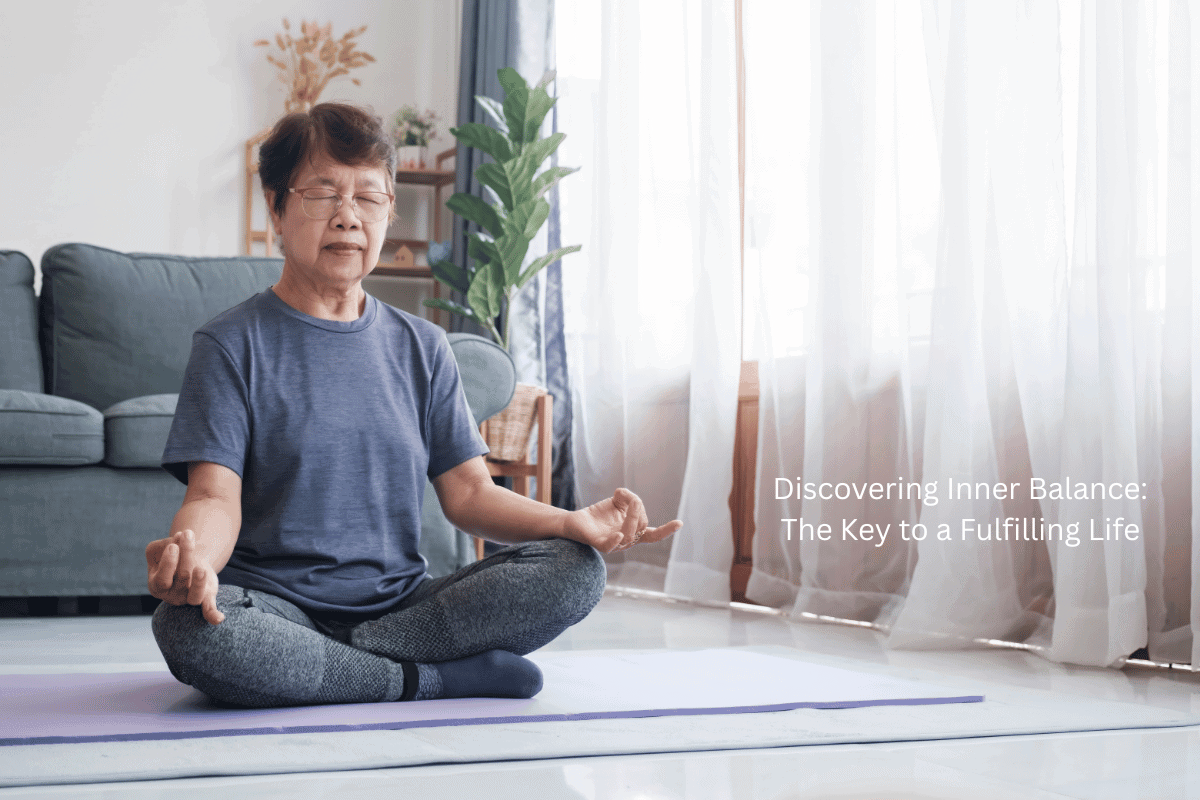Discovering Inner Balance: The Key to a Fulfilling Life
Life is a journey that requires finding balance within oneself. In today’s fast-paced world, it’s easy to lose sight of what truly matters. However, finding inner balance is crucial to living a fulfilling life. It requires self-discovery, mindfulness practice, and a commitment to personal growth.
Finding inner balance is not a one-time event, but a continual process. It’s about learning to navigate life’s challenges while staying grounded in your values and beliefs. This requires taking the time to understand yourself at a deeper level, and cultivating a sense of mindfulness through daily practice.
By incorporating mindfulness practice into your daily routine, you can learn to stay present in the moment and let go of distractions. This allows you to become more in tune with your inner self, and develop a deeper sense of self-awareness.
Join us as we explore the path to inner harmony, and learn practical tips for nurturing emotional well-being, practicing self-care, and cultivating a positive mindset. Let’s embark on a journey of self-discovery and find the inner balance that leads to a fulfilling life.
The Path to Inner Harmony
Finding inner harmony is a journey of self-discovery and personal growth. It involves nurturing emotional well-being and achieving balance in all aspects of life. Here’s how you can achieve harmony:
1. Embrace Change
Personal growth takes place when you embrace change. You need to step outside your comfort zone and try new things to discover what resonates with you. It helps to take small steps towards embracing change and remind yourself that growth is a process, not an overnight achievement.
2. Practice Self-Awareness
Emotional wellbeing requires a deep understanding of oneself. Make a conscious effort to learn about your strengths, weaknesses, triggers, and emotions. Self-awareness helps you to develop emotional intelligence and regulate your emotions effectively.
3. Prioritize Self-Care
Setting aside time for self-care is crucial to achieving inner harmony. Self-care practices such as meditation, exercise, journaling, and spending time with loved ones nourish our body, mind, and soul. Moreover, self-care fosters personal growth and helps us to cultivate positive relationships.
4. Cultivate Gratitude
Cultivating gratitude helps us to appreciate the little things in life and focus on the positives. Gratitude promotes emotional well-being, enhances resilience, and reduces stress. To cultivate gratitude, start by reflecting on the things you’re thankful for, be it something as simple as a good cup of coffee or a supportive friend.
5. Set Boundaries
Boundaries are essential to maintaining emotional well-being and achieving harmony in relationships. It is crucial to communicate your boundaries clearly and respectfully, whether it’s with colleagues, family members, or friends. Setting boundaries helps to prevent burnout, reduce stress, and foster healthy relationships.
Remember, achieving inner harmony is a continual process that requires ongoing practice. Adopting these steps can help you to cultivate emotional well-being, personal growth, and achieve balance in life.
Embracing Mindfulness: A Holistic Approach
In our quest for finding inner balance, mindfulness practice plays a crucial role in adopting a holistic approach towards self-care. Mindfulness is the practice of being present in the moment, focusing on the sensations in our body and the thoughts in our mind, without judgment.
It’s about cultivating awareness and acceptance of our experiences, whether they are positive or negative. By practicing mindfulness, we can learn to observe our thoughts and emotions without getting caught up in them, and develop a sense of inner peace and calmness.
Adopting a holistic approach to self-care means taking care of our physical, mental, and emotional well-being. Mindfulness practice can help in achieving this balance by reducing stress and anxiety, improving sleep quality, boosting mood, and enhancing our overall health.
Practical tips for incorporating mindfulness into daily routines include practicing mindful breathing, body scanning, and mindful meditation. These practices can be done in as little as 10-15 minutes a day and can have a significant impact on our well-being.
It’s essential to approach mindfulness with an open mind and a willingness to practice consistently. Like any skill, it takes time and effort to develop, but the benefits are well worth it. By embracing mindfulness as a holistic approach to self-care, we can cultivate inner well-being and find lasting inner balance.
Cultivating Inner Peace
Inner peace is a state of mind that allows us to feel calm and centered, even in the midst of chaos. It is essential for effective stress management and overall well-being. Here are some techniques for cultivating inner peace:
- Meditation: Regular meditation practice can help quiet the mind and reduce stress levels.
- Deep breathing: Taking deep breaths and focusing on the breath can help calm the body and mind.
- Nature walks: Spending time in nature can be a great way to unwind and connect with the present moment.
It’s important to find what works best for you and to make time for these practices regularly. Cultivating inner peace is an ongoing process and requires continual effort.
The Power of Self-Care
Self-care is essential to maintaining emotional well-being and promoting personal growth. It involves taking deliberate actions to care for oneself physically, mentally, and emotionally, with the goal of achieving inner balance.
By prioritizing self-care, individuals can enhance their overall quality of life and increase their capacity for resilience in the face of challenges. Whether through exercise, meditation, or spending time with loved ones, self-care practices can provide a much-needed sense of peace and fulfillment.
Self-Care and Emotional Well-being
Self-care is closely associated with emotional well-being. Engaging in self-care practices can help individuals manage stress and anxiety, cultivate optimism, and increase feelings of self-worth. By attending to their emotional needs, individuals can better navigate life’s challenges and improve their relationships with others.
Examples of self-care practices that promote emotional well-being include journaling, seeking therapy, and engaging in creative hobbies. These practices enable individuals to process their emotions and gain insights into their thoughts and behaviors.
Self-Care and Personal Growth
Self-care is also an integral component of personal growth. By engaging in self-care practices, individuals can identify their values and purpose, pursue their passions, and develop a stronger sense of self.
Prioritizing self-care enables individuals to discover new interests, explore new perspectives, and challenge themselves to grow in ways they never thought possible. By fostering a commitment to self-care, individuals can develop greater confidence in their abilities and make meaningful contributions to their communities.
Incorporating Self-Care into Daily Life
Incorporating self-care practices into daily routines can seem daunting, but it is essential to achieving inner balance. Start by identifying a few self-care practices that resonate with you and commit to incorporating them into your daily routine.
For example, try taking a daily walk outside to clear your mind, or practicing gratitude by writing down a few things each day that you are thankful for. Over time, these small acts of self-care can add up to significant improvements in your emotional well-being and personal growth.
Nurturing a Positive Mindset
A positive mindset is essential in finding inner balance and achieving emotional well-being. It allows individuals to take control of their thoughts and focus on the good in life, rather than dwelling on negativity. Nurturing a positive mindset requires practice and deliberate effort, but the benefits are worth it.
Strategies for Nurturing a Positive Mindset
1. Gratitude – Taking time each day to reflect on the things you’re thankful for can shift your focus towards positivity and abundance.
2. Affirmations – Repeating positive affirmations to yourself daily can help reprogram negative thought patterns into positive ones.
3. Surround yourself with positivity – Surrounding yourself with positivity, such as uplifting people and inspiring messages can have a profound effect on your mindset.
4. Practice mindfulness – Being present in the moment and focusing on the present can help alleviate anxiety and negative thoughts.
5. Self-care – Taking care of yourself physically, mentally and emotionally is essential in nurturing a positive mindset and achieving personal growth.
The Power of a Positive Mindset
Nurturing a positive mindset is key in achieving emotional well-being and personal growth. It allows individuals to reframe their perceptions of challenges and setbacks, and view them as opportunities for growth. A positive mindset also promotes resilience in the face of adversity, leading to a more fulfilling life.
Letting Go of Negativity
One of the most significant barriers to inner balance is negativity. Whether it manifests as negative thoughts, beliefs, or toxic relationships, letting go of negativity is crucial for emotional well-being and self-discovery.
Negative thoughts can lead to a vicious cycle of despair and pessimism. It’s essential to identify these thoughts and replace them with positive affirmations to cultivate a positive mindset. In addition to monitoring negative thoughts, it’s also helpful to distance oneself from relationships that sap energy and create toxicity. Breaking away from these relationships is a crucial step towards inner balance and growth.
Another critical aspect of letting go of negativity is releasing past grievances. Resentment, anger, and regret are emotional anchors that hold us back from self-discovery and inner harmony. Forgiveness is a powerful tool that can lead to a profound sense of release and growth. Letting go of past grievances can help us to develop an optimistic outlook on life and embrace new opportunities.
Finally, practicing gratitude is a powerful technique for letting go of negativity and embracing positivity. By focusing on the things we are thankful for, we can shift our perspective towards the positive and displace negative thoughts. Whether it’s through journaling, mindfulness practice, or verbal affirmations, practicing gratitude can help to promote emotional well-being and self-discovery.
Letting go of negativity is not an easy process, but it’s an essential step towards finding inner balance. By cultivating a positive mindset, releasing past grievances, and practicing gratitude, we can create space for growth and embrace new opportunities for self-discovery and emotional well-being.
Creating Inner Harmonies: Body, Mind, and Soul
A holistic approach to inner balance involves nurturing the interconnectedness of the body, mind, and soul. These components of the self cannot be isolated from one another; rather, they work together to promote overall well-being. Adopting a holistic approach to self-discovery and personal growth can lead to a deeper understanding of oneself and a greater sense of inner harmony.
There are many practices that can aid in the cultivation of inner harmonies. Mindfulness meditation, yoga, and deep breathing exercises promote physical health, relaxation, and mental clarity. Engaging in creative activities such as art, music, or writing can tap into the soul’s expression and provide a sense of fulfillment.
Self-discovery practices such as journaling, therapy, or simply spending time alone in nature can enhance emotional well-being and provide clarity on life’s purpose. It’s important to approach self-discovery with curiosity and openness, allowing oneself to explore and understand the depths of their being.
Personal growth practices such as setting goals, learning new skills, and pushing oneself outside of comfort zones can lead to a sense of achievement and self-empowerment. Through personal growth, one can expand their understanding of the self and the world around them.
By nurturing the body, mind, and soul, one can create a harmonious internal environment that allows for a fulfilling and balanced life. It’s important to approach self-care as a holistic practice, considering the interconnectedness of all aspects of the self. Through ongoing self-discovery and personal growth practices, inner balance can be sustained and a deeper sense of inner harmony can be achieved.
Finding Balance in Relationships
When it comes to finding inner balance, our relationships can play a crucial role. Whether it’s with family, friends, or romantic partners, balanced relationships can contribute greatly to our emotional well-being and personal growth. Here are some tips for creating and maintaining balanced relationships:
Effective Communication
Clear and effective communication is key to any healthy relationship. This means actively listening to the other person, expressing oneself honestly and respectfully, and working together to find solutions to conflicts. By practicing effective communication, we can build trust and deeper connections with those we care about.
Establishing Boundaries
Setting boundaries can be difficult, but it is essential for our emotional well-being and personal growth. Boundaries help us define what is and isn’t acceptable in our relationships, allowing us to take care of ourselves and others. Remember that it’s okay to say no and prioritize your own needs in order to maintain balance.
Practicing Self-Care
In any relationship, it’s important to practice self-care and prioritize your own well-being. This means setting aside time for yourself, engaging in activities that bring you joy, and seeking support when needed. By taking care of ourselves, we become better equipped to care for others and maintain balanced relationships.
Remember that finding balance in our relationships is an ongoing process. By prioritizing effective communication, boundaries, and self-care, we can build stronger and more fulfilling connections with those we love.
Sustaining Inner Balance: Continual Practice
Inner balance is not a one-time achievement but a continual practice. It requires ongoing effort, dedication, and self-discovery to maintain. Incorporating mindfulness practice into daily routines can help keep us centered and focused, allowing us to navigate life’s challenges with greater ease and grace.
One effective way to sustain inner balance is by setting aside a few minutes each day for self-reflection. This can be done through meditation, journaling, or simply taking a walk in nature. By connecting with ourselves on a deeper level, we can gain greater insight into our thoughts, feelings, and behaviors, and make conscious choices that align with our values and goals.
Finding Your Mindfulness Practice
There are various mindfulness practices to explore, and it’s important to find one that resonates with you. Some people find sitting meditation to be beneficial, while others prefer mindful movement practices like yoga or Tai Chi. Whatever practice you choose, make sure it’s something that you enjoy and can commit to on a regular basis.
Self-discovery is also key to sustaining inner balance. We must continually explore our beliefs, values, and goals to ensure they align with our inner truth and purpose. This may involve seeking out new experiences, trying new hobbies, or even challenging our own limiting beliefs.
Making it a Habit
Like any habit, sustaining inner balance requires consistency and commitment. Start by setting small goals for yourself, such as meditating for five minutes each morning or journaling before bed. Gradually increase the amount of time you devote to your mindfulness practice as it becomes a natural part of your routine.
Remember, inner balance is not a destination, but a journey. It’s a continual process of growth and self-awareness that requires ongoing effort and dedication. By incorporating mindfulness practice and self-discovery into our daily lives, we can sustain inner balance and live a more fulfilling life.





